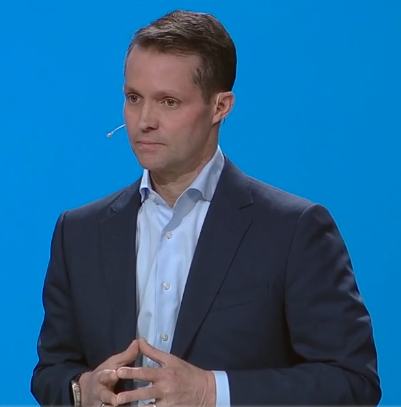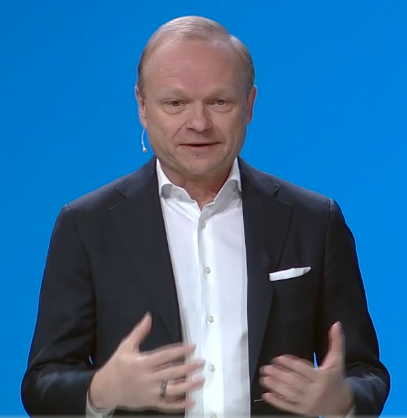Nokia Swaps Out CEO

Nokia (NYSE: NOK) has announced that CEO Pekka Lundmark will leave the company March 31, ceding the top post to U.S. executive Justin Hotard on April 1.
According to Nokia's board chair Sari Baldauf, the transition has been in the works since last spring, when Lundmark reportedly told the board he would like to step aside from executive roles.
According to Baldauf, the succession committee looked inside and outside the company and ultimately felt that among other things, the worldwide market opportunities encouraged a choice from America. Hotard and his family will move to Espoo, Finland, as he takes the job.
Lundmark will stay until the end of the year in an advisory role to Hotard.

Justin Hotard. Source: Nokia
Lundmark Passes the Torch
During a press conference Monday announcing Hotard’s appointment, CEO Lundmark cited his gratitude for five years as CEO and spoke of the company’s readiness to expand in new directions. “It has been a true privilege to lead Nokia,” he said. “These types of decisions are always very difficult, and in a way the timing is never perfect.” But he added: “We are well positioned for growth in new markets such as datacenters, private industrial networks, and communications solutions for the defense sector, and to continue to take market share with the service provider customers.”
Lundmark said that telco purchases are starting to recover from a downturn in 2023 and the first half of 2024. That was the timeframe when Nokia lost a $14 billion 5G contract with AT&T to Ericsson. Subsequently, there were rumors that Samsung and other would-be acquirers were eyeing up Nokia’s $10 billion mobile networking business.

Pekka Lundmark. Source: Nokia
Now, however, Nokia seems to have an eye out for defense contracts based on 5G mobile networking. In May 2024, Nokia completed the acquisition of the Fenix Group (amount undisclosed), which specializes in mobile radios for tactical defense communications. And asked today in an interview with Bloomberg whether Nokia would be interested in selling its mobile assets to Samsung, Hotard said only that mobile networks are “a core asset” for Nokia.
Datacenter and AI Are Prime Opportunities
Datacenter networking came up repeatedly at Monday’s press conference. “The hundreds of billions of dollars being invested in datacenter today from a technology standpoint of course starts with compute, accelerators and GPUs,” said Hotard. “But the second thing is the network and the connectivity, and further it’s not just the connectivity inside the datacenter but the connectivity across datacenters.”
Cue Nokia’s planned acquisition of optical networking provider Infinera for $2.3 billion, which Nokia has said will close before April 1, the day Hotard takes charge. That deal could boost Nokia’s datacenter interconnection capabilities.
Evidence that Nokia has its eye on datacenter networking was also clear from the announcement of its datacenter management system, Event-Driven Automation (EDA) in October 2024. While Nokia faces stiff competition in the datacenter space from Cisco, Arista, and Juniper Networks, the company seems determined to soldier on. One good sign is that CoreWeave in September 2024 chose Nokia to supply networking infrastructure for its services.
Leaving the Intel Titanic
Justin Hotard comes to Nokia from Intel, where he spent just over a year as executive vice president and general manager of the Data Center & AI Business Group, which includes the company’s Xeon processors, which contain GPUs and accelerators. Reporting directly to CEO Pat Gelsinger, he had a front-row view of Intel’s down motion prior to Gelsinger’s departure. He also oversaw a division that continued to lose money. By spring 2024, he was clearly open to a way out of arranging the deck chairs on Intel’s Titanic.
Hotard has a long executive career for his age (51). An engineer with an MBA, he held a number of executive posts at NCR corporation from 2007 through 2014, ending his tenure there as president of NCR Small Business. He moved on to HPE, where he worked in a variety of leadership positions before ending up as executive vice president and general manager of High-Performance Computing, AI and Hewlett Packard Labs.
Hotard said Monday that he will spend the first few months of his new job asking questions and exploring Nokia’s team, customers, partners, and investors to determine how best to accelerate the company’s networking infrastructure business.
Futuriom Take: Justin Hotard brings knowledge of AI infrastructure and datacenter networking to his new post as CEO of Nokia. Following Pekka Lundmark's steering of Nokia away from just the telecom market, he plans to explore opportunities in datacenters, private industrial networks, and communications for the defense industry.















